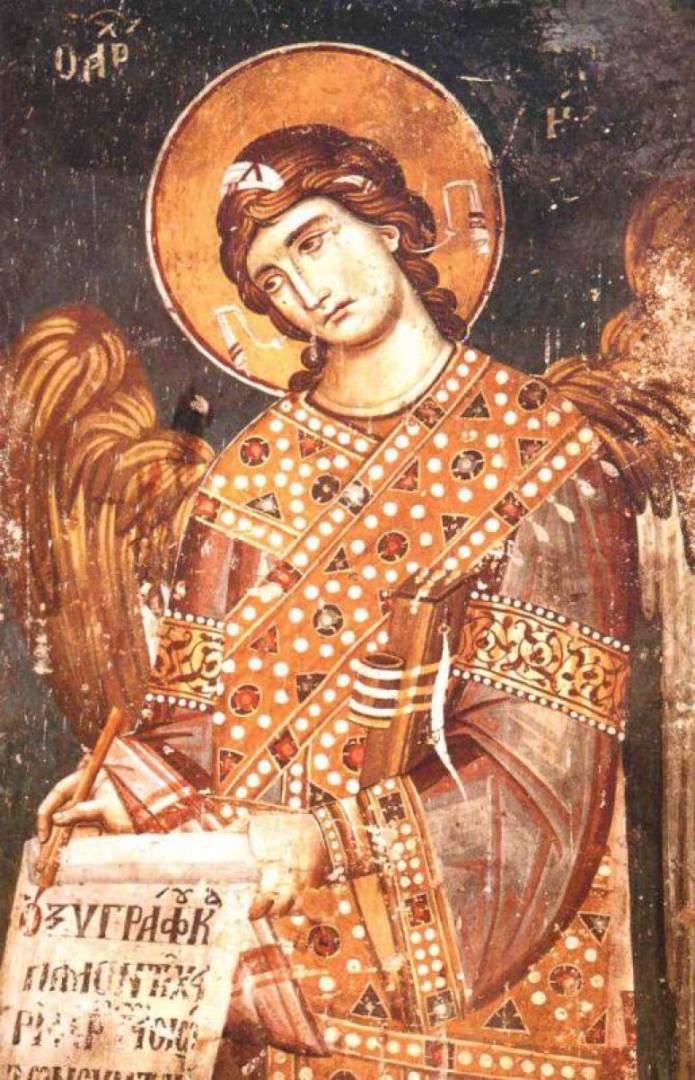
Calendar for April 8 - Council of St. Archangel Gabriel
The Church received from ancient times, from the Jerusalem typics and the constitution of the great family of St. Sava the Sanctified, that on the first day after the Annunciation of the Blessed Virgin Mary, the assembly of St. Archangel Gabriel, the harbinger of joy, is celebrated. Because we should pay respect in a worthy way to the one who served the secret of our salvation, bringing the Most Pure Virgin the news about the incarnation of God the Word in her most pure womb. When all the citizens of a city show great respect to the emissary of the earthly emperor who brings to the city some kind words of the emperor, all the more respect should be paid on a special holiday to the emissary of the Heavenly Emperor, the wonderful Prince of Angels, who brought the all-merciful news of eternal salvation to the entire human race. How famous is this emissary, who previously pointed out his dignity to Saint Zacharias, saying: I am Gabriel who stands before God (Lk. 1, 19), that is, I stand closer to the throne of God than other Angels. And just as in the earthly kingdom the dignitary who is closest to the emperor has more prestige than the other dignitaries who stand further away, so in the heavenly kingdom: the holy Angels who stand closer to God and closely observe God's mysteries, shine with greater glory and reputation than the other Angels who are in lower ranks.
The Holy Scriptures say that there are seven Angels of the highest rank, the supreme princes of Angels, who always stand closest to God and the inaccessible glory of God. In the book of Saint Tobit, it is written that the companion of young Tovi announced that he was one of the seven Angels standing before God (Tovi 12, 15). And St. John the Theologian in his Revelation mentions the seven supreme Angels, saying: Grace and peace to you from Him who is, and who was, and who is to come; and from the seven spirits who are before his throne (Rev. 1, 4). Of those seven Angels, one is St. Gabriel, the second in number, after St. Michael, the first. Because they are listed by name like this: Michael, Gabriel, Raphael, Uril, Selatil, Yegudil, Varahil.
Someone may ask: Why didn't God send to the Blessed Virgin the first in number, the angel Michael, but the second in number, Gabriel? It should be known: all seven supreme Angels are equal among themselves in terms of dignity, only when enumerating they start with Michael; and each of them has his own separate service: Michael is the conqueror of the adversary; Gabriel – herald of God's secrets; Rafail – doctor of human ailments; Uril - the enlightener of the darkened, because he is the shining of the divine fire; Selatil - prayer book, because he constantly prays to God for people and encourages people to pray; Jegudil - glorifier of God, because he identifies people who do anything for the glory of God, and prays for their reward; Varahil – giver of God's blessing; and our mediator of God's benefactions. Therefore, Michael would not be sent with good news, since that is not his ministry; it is his: to hold the drawn sword, to strike at the enemies, and to pursue them. Gabriel would be sent, because his service is to announce the secrets of God, as he announced to the holy prophet Daniel the liberation of God's people from Babylon and the time of the coming of the Messiah, and to Saint Zacharias - the birth of the holy Forerunner from a barren mother. And it is said that he also instructed the holy prophet Moses in the desert when writing the Book of Genesis. There is also a pious opinion that he announced the good news to the holy righteous Joachim and Anna and the conception of the Blessed Virgin Mary, and that he was a nurturing angel to the Immaculate Virgin from conception and birth, and that he brought her food in the Holy of Holies. He brought her good news about the conception of the Son of God. Gabriel would also be sent for this reason, so that the Blessed One could be known by his name. Because the name Gabriel means the virtue of God, or God and man.
And with his very name, the Herald confirmed that the strong God, the Lord, would become a perfect man in the womb of the Virgin, that is, a perfect God would become a perfect man. And a perfect, complete man, not in terms of physical age, but in terms of virtue and reason. Because the rest of the children, growing in their mother's wombs, have neither reason nor virtue. And taking root in the womb of the Blessed Virgin Child, from the very moment of his conception in his little body he would become a perfect man with unspeakable reason and invincible virtue. Because the prophet says: I approached the prophetess, and she conceived and gave birth to a son. And the Lord said to me: give him a name: quick to prey, quick to plunder. Because before the child learns to shout: my father and my mother, he will carry away the treasure of Damascus and the booty of Samaria (Is. 8, 3-4), that is, the child, who has not yet spoken, but has great strength and power to defeat his enemies. And that is what Gavril portrayed with his name: God - a man, a strong God, who was conceived by his annunciation, and by the descent of the Holy Spirit into the incorruptible womb of the Virgin.
Saint Proclus, the Patriarch of Constantinople, speaks of this as follows: The very name of the Angel who announced the good news to the Virgin Mary is miraculous, because his name is Gabriel. He preached the good news, and with his name he prefigured the One who was to come into the world. Because Gabriel means God and man. This herald of God is very notable both for his name and his ministry. And the most famous is that the secret, always hidden and unknown to the Angels, was first revealed to him by God, and he brought it to the Virgin. And as much as the secret of the Incarnation of God is greater than other secrets, previously revealed through him to the holy prophets, his reputation became greater among his group from the moment of the Annunciation, because they respected him as the most intimate seer of the most unknown secrets of God.
Saint Dionysius the Areopagite says about these seven supreme Angels, that they always stand steadfastly before God as the closest ones, while all the others are sent to various offices. But for the execution of the great mysteries of God, these are also sent. Because the holy apostle Paul says: Are not all official spirits who are sent to serve? (Heb. 1, 14). And what secret of God is greater than the unimaginable, unfathomable, inexpressible incarnation of Christ? Therefore, because of such a great secret, it was necessary to send a great Angel, the most intimate observer of the secrets of God - St. Gabriel, who stands steadfastly before the throne of God.
The Holy Fathers think that Saint Gabriel belongs to the first and highest rank of the heavenly Powers, that is, to the seraphim rank, since the Seraphim stand closest to God. He was called an archangel because he brought the good news of the Annunciation to the Blessed Virgin, and made her happy, and through her, every creature, not only in this world but also in the heavenly world. St. Damascene sings it like this: The heavenly creatures rejoiced with love, and the earthly ones trembled in terror, when the pure voice came to you, Mother of God; because one celebration shines for both, when the Incorporeal brings joy to you. - St. Dionysius the Areopagite testifies: All angel ranks have their special places, determined by God: some are closer, others further away, while the seraphim rank is closest to God. Because the prophet Isaiah says: I saw the Lord sitting on a high and elevated throne, and the Seraphim stood around Him, each of them had six wings (Is. 6, 1. 2). And since St. Gabriel is one of the seven Angels who stand closest to God, it means that he is of seraphim rank, the second among the Seraphim. - And St. Andrew of Crete also says that he is one of the supreme Angels, saying: God orders one of the supreme Angels to perform the mystery of the Annunciation. - If it is from the supreme ones, then it is from the seven spirits that always stand before God; if he is of the seven spirits, he is of the seraphim. And who among the angels is more supreme than the Seraphim? and who of the Seraphim is closer to the throne of God? Seraphim is therefore Saint Gabriel, and a special one at that.
That he is a Seraphim is also evident from this: in order to accomplish a great work of God, it was necessary to send a great Angel. And since the incarnation of the Word is a work of God, greater than all the works of God, Saint Gabriel, greater than the other Angels, would be sent to announce it. For just as the supreme prince of darkness came to Eve bewitching her, so the supreme prince of heavenly light came to the Immaculate Virgin with good news. It was fitting that Seraphim should be sent to Mary, who burned with seraphim's love for God.
That supreme prince among the Angels, that closest to God of the seraphim, the cosmic Archangel, who heralded salvation to the whole world, we devoutly respect, with love and joy we celebrate his feast, offering him thanks for his great benevolence to the world, which he did from the beginning, and now do, always praying for us to the incarnate God. May all our sins be forgiven through the prayers of the holy Archangel Gabriel, amen.
Easter fast. (Loyalty to the Annunciation)
PHOTOS
RELATED ARTICLES
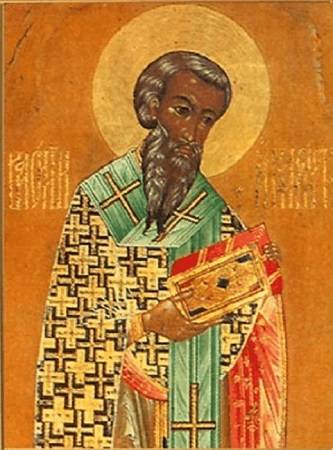
Calendar for May 9 His Homilist Basil of Amasia
Licinius, the son-in-law of Emperor Constantine, whose sister he had married,...
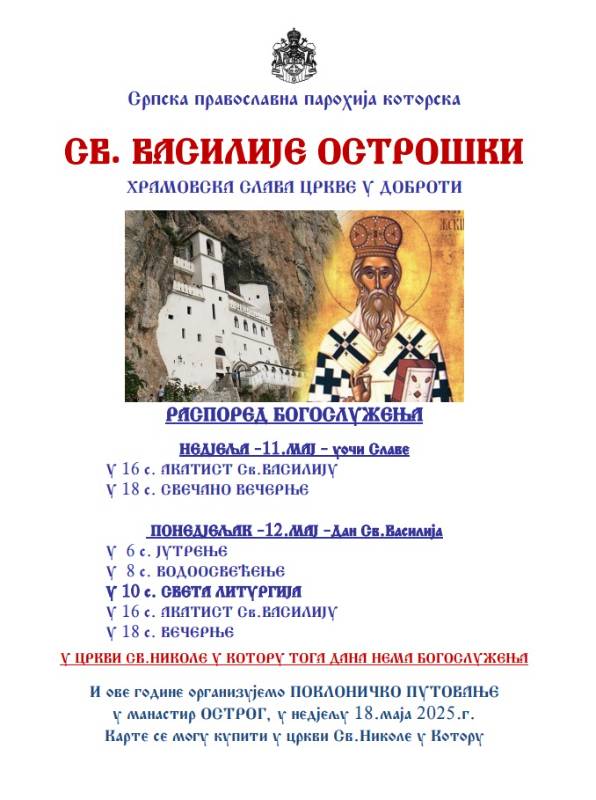
WORSHIPS ON THE OCCASION OF ST. VASILIJE OSTROŠKI
SERBIAN ORTHODOX PARISH OF KOTOR ANNOUNCES WORSHIPS ON THE OCCASION OF ST....
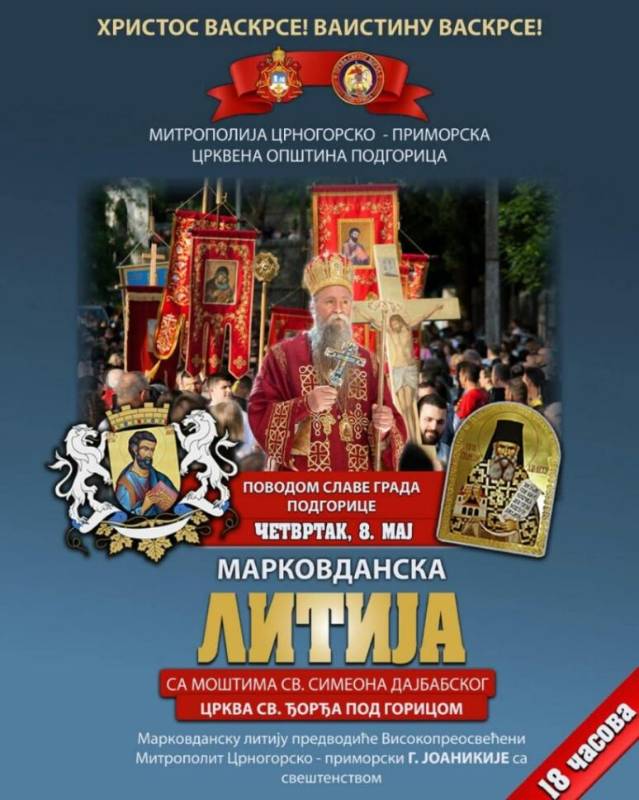
St. Mark's Day procession in Podgorica
On the occasion of the celebration of the city of Podgorica, the...


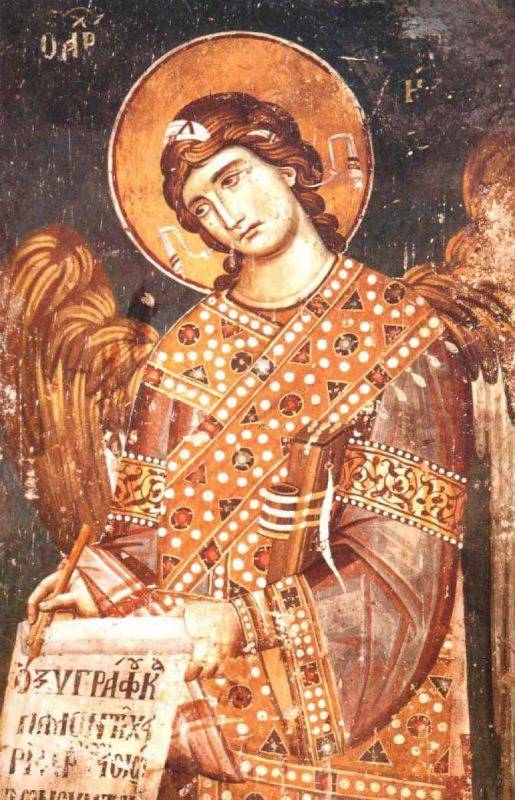

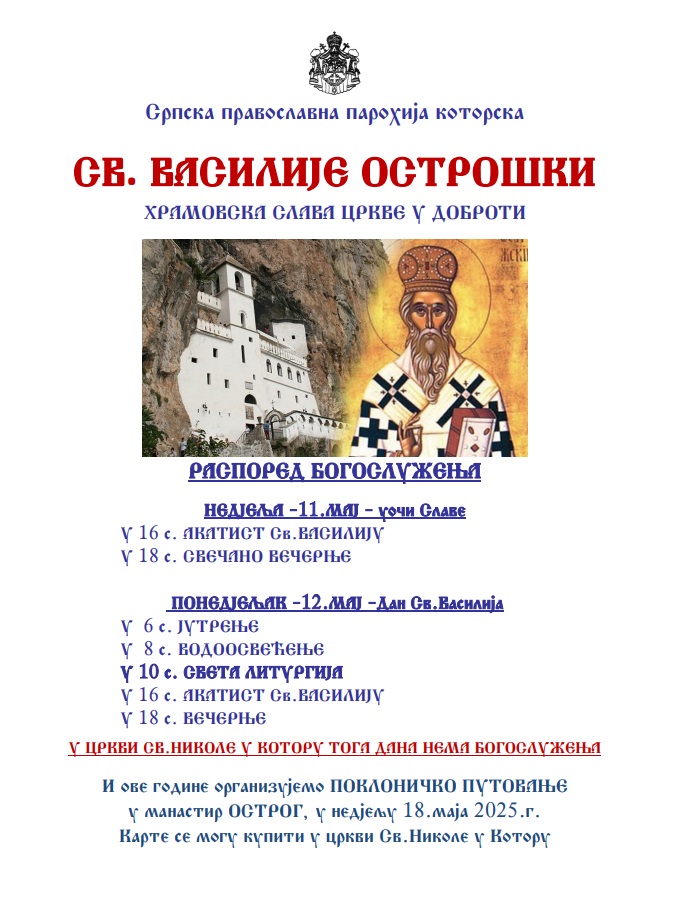
.png)